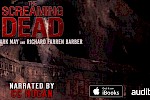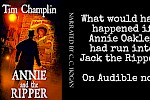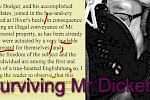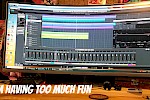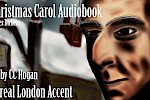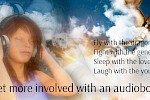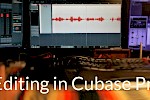You are your poetry. You should be the one to perform it.
Audiobook Menu
FAQs:
Reading Your Book
Recording Your Book
Editing Your Recording
Technical Questions
Recording your own poetry
Other Articles:
A General Guide
Recording Dirt
Recording My Poetry
Preparing Your Manuscript
Plan your audiobook as you write
Using iZotope RX 6 with Cubase
Editing in Cubase demonstration
A bit on Punch & Roll
Should you delete breaths?
Setting up your Studio
External Articles & Resources
Punch and Roll
Following on from my articles on Audiobooks, I thought I should talk a bit about poetry.
Although many of the techniques and technology tips are the same as recording any other spoken word media, poetry does have some specifics when it comes to presentation and attitude. This article is aimed at the poet who is less confident when it comes to using their own voice to record their poems.
I am a great believer that poetry is best delivered with the voice and not the printed word. That is not to say I think poetry books are a waste of time, far from it, but when a poet performs their poems, they give the verses nuances and emotions that might otherwise be missed by a reader. I once saw a young girl perform what was a very silly poem about her dad. Halfway through she stumbled and a tear ran down her cheek. Her father had left some time before, and the girl was calling out to him through her words. Although not clear in the poem itself, it was like a shout when she spoke it out loud.
I think most poets would like to perform their poems, but it takes a lot of guts and self-confidence, and I completely understand those that recoil from the idea. Recording a poem is a halfway house and, if you like the result, putting it up on YouTube or SoundCloud is a lot less traumatic than standing behind a mic in a pub somewhere.
In this series of FAQs, I will try to answer a few common questions about how to go about recording your poetry and how you can improve your recording.
But first...
Getting Confident
The biggest barrier for anyone, poet or otherwise, when it comes to recording is a lack of confidence in one's own abilities. "I am nervous." "My voice sounds horrible." "It is all weak and shaky." "It sounded better in my head."
Well, everyone says that, and with some justification. Most actors out there spend years having their voices trained so that they can present words beautifully. But many of the best poets and comedians (they are pretty similar) are untrained. So why do they sound good?
The answer is two-fold. Firstly, lots of confidence, and secondly, don't give a shit. And to be honest, that is half the trick.
When you perform a poem, you are not acting it out, you are giving the audience an insight into what is going on in your head. Ninety percent of poems are just the detritus of the poet's imagination or angst in the first place, so who better than the poet to spew it out?
When you write a poem, unless you are writing greetings cards, you are writing what you feel and you write it in your own voice. If you are a quiet person by nature, then your poems will tend to be more tentative, if you are loud and aggressive, then your poems will beat people up. Both are good, both are legitimate, and both reflect the poet, and that is who we are talking about here.
When you lift the poem off the page, give it life by speaking it out loud, the first thing you must do is be the poet who wrote the poem in the first place. You must be you.
That sound's terribly easy, but it isn't. It is scary, can feel unreachable, and almost alien, like trying to live in another skin. Of course, it isn't any of those things, it is perfectly natural. You just have to kid yourself into believing it.
Where do I start?
Obviously, I have no idea what poems you have written or are planning to write, but if I were to guess I would say that at least one of them is probably some sort of angry rant.
Although when you perform a poem you should not act out a character as such, you should be the poet, there is an element of acting involved. Anger is the easiest thing to act out. At the bottom of this article, I have put one of my youtube offerings of a rant - warning, it is a little rude!
The thing with anger is that we are all really good at it and poets better than most. Humans are masters at screwing things up and anger will be the result. Shouting and raving are second nature to us.
Love, soft words, are less intuitive. I am blessed with a deep warm voice and most girlfriends over the years have loved phone calls with me, but most people can sound idiotic when they get all soft and gooey and really need to practice.
For your first recording (the one you will probably never play me), find a rant. Doesn't have to be long, but just long enough to get into. Stand up in front of the microphone, strike a belligerent pose (no one can see you) and get angry.
Don't worry about mic quality or distortion or anything at this point, just lay into the poem like you are beating up the last arsehole you went out with.
Once you record it, DON'T PLAY IT BACK! You will hate it. Erase it and do it again. And do it again and again until you are doing it like a train conductor reeling out the stations.
Once you have stopped feeling stupid and that someone must be peeking through the curtains watching you, play it back. I guarantee that you will be surprised at the result.
Now, erase that, get the mic set up correctly and the recording levels adjusted, and record it properly. It might still not be exactly right and you might not want to play it to anyone, but you are on your way.
You have taken one of your precious verses, you have sucked it back into your body, and you have retold it as if you wrote it at that moment. It is a great feeling that, so sing out your words and give them their freedom like releasing a bird into the sky.
You are now ready to tackle your other poems and then upload them somewhere.
Below is a growing list of FAQs - short tips that might help you. If you have any questions you think I should add to the list, use the form on the main Audiobook Page. Good luck!
FAQs
Is poetry recording different from stories?
Yes and no. From the point of view of the "telling", then no. You are still telling a tale, even if it is a poem. However, depending on the style of poetry, then the presentation can be very different, much more like a performance.
Who am I speaking to?
Poetry is a little different from recording narration and is closer to singing. However, if you imagine too big an audience for audio recordings, you run the risk of depersonalising it.
So, tell the story of the poem to one person, but give it more energy.
How fast should I read?
Unlike narrating a book, a poem is a much more stylised form of writing. The speed will depend on the demands of the poem itself.
However, this is still a recording where the listener cannot see your lips move, so don't go so fast that you leave them behind.
How much emotion should I show?
Lots!
If reading a poem makes you laugh or cry, that is no problem at all. You wrote the poem for a reason, your voice probably tells us more about that reason than the words themselves.
However, you should moderate it so you don't ruin the read. You may find that highly charged poems take a few more takes.
How many takes?
I often record my poems five or six times before I am happy, plus picking up in the middle of the read.
Don't be afraid of retakes. All poets and singers spend a lot of time getting their performance right - it is expected that it might take a while.
I think my poem might be unreadable
We all get that.
The one thing about recording your poetry is that you will soon discover those poems that perhaps are not as poetic, and therefore readable, as you first thought.
If it is simply not working, abandon it.
Once you get into recording your poems, you may find it makes you a better poet. Poems should be performable, and as you become a better performer, you may well become a better writer too.
Do I need to wear headphones?
With poetry, you really don't need to wear headphones as there is nothing to hear back unless you are rapping to music.
I think for many people new to recording, hearing your own voice through headphones is offputting, so don't worry about it. Leave the headphones off and just get on with recording your wonderful verse.
Drunk Verse
A rant and a really good example of where to start when it comes to recording. Not for the feint of heart.











